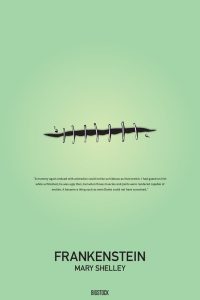 Julia Armfield’s “The Collectibles” is an obvious homage to Mary Shelley’s Frankenstein, and having just finished reading Frankenstein for a separate class, I was able to notice numerous similarities between the two texts apart from the main parallel of creation. On the first day of the class, we were asked to come up with a list of characteristics of a monster. Some of these included “evil,” “antagonist,” “mysterious,” “different,” and “cautionary tale.” As we read through the story, it quickly became clear that these characteristics could not only be applied to Frankenstein’s monster, but also Frankenstein himself. His desire to create the monster comes from his feelings of loneliness and conceit; he wants to be worshipped, to be seen as a God by his creation, and to become famous by creating what has never been created before. It is also this conceit that leads him to reject his creation, first because of its horrifying appearance and later because of the crimes it goes on to commit—crimes that the monster only commits because of Victor’s initial rejection. We soon realize that the true cautionary tale is not the monster, but Victor Frankenstein; not only has overstepped his limits by trying to play God, but he has allowed his arrogance to quell any benevolence or potential that his creation might have had.
Julia Armfield’s “The Collectibles” is an obvious homage to Mary Shelley’s Frankenstein, and having just finished reading Frankenstein for a separate class, I was able to notice numerous similarities between the two texts apart from the main parallel of creation. On the first day of the class, we were asked to come up with a list of characteristics of a monster. Some of these included “evil,” “antagonist,” “mysterious,” “different,” and “cautionary tale.” As we read through the story, it quickly became clear that these characteristics could not only be applied to Frankenstein’s monster, but also Frankenstein himself. His desire to create the monster comes from his feelings of loneliness and conceit; he wants to be worshipped, to be seen as a God by his creation, and to become famous by creating what has never been created before. It is also this conceit that leads him to reject his creation, first because of its horrifying appearance and later because of the crimes it goes on to commit—crimes that the monster only commits because of Victor’s initial rejection. We soon realize that the true cautionary tale is not the monster, but Victor Frankenstein; not only has overstepped his limits by trying to play God, but he has allowed his arrogance to quell any benevolence or potential that his creation might have had.
In “The Collectibles,” we never get to see how Jenny’s creation turns out, but like Frankenstein, it is clear that she already fills the role of antagonist. Like Victor Frankenstein, she longs to be worshipped and cherished by someone that she deems perfect; her vanity is reflected in her need to acquire all the best features for her creation and also suggests that this sort of specificness is the reason why she is still alone. She sees herself as everyone’s victim and takes it upon herself to correct this through fantastic means. She takes what she needs from the men of her choice because she believes that she is owed by them—at this point, she sees all men as the same, all deserving of the same fate. She is just as arrogant and self-pitying as Victor, and it isn’t hard to see her journey playing out in much the same way as his. If her creation does not turn out exactly as she desires, will she reject him? What will happen then? Will she demolish the creature and keep trying until she gets it right? From what we know of her so far, none of this is outside the realm of possibility. Another similarity is how notions about parenthood are also transgressed by both of these characters. As a man, Victor Frankenstein cannot create life in the way that women can, so to have his creation turn out so monstrously is nature’s way of reminding him of his limits. Jenny, on the other hand, is a woman, but her reasons for creation have nothing do with nurturance or genuine affection; she is thinking only of herself and what her creation will do for her. Once again, the creator is the cautionary tale of this story, not the creation.
I agree this story is Frankenstein with a female instead of Victor, building the perfect man. Unlike Frankenstein, Jenny’s friends are aware of what she is doing and it has become her thesis-perfectly acceptable!
I agree with your comparison of Jenny and Victor. She is certainly playing God here. I can also see similarities between her and the creature, though. Frankenstein’s creature wanted a mate of his own kind, and here Jenny wants one that fits her standards.
I agree with all three of you. The connection between Frankenstein and “The Collectibles” is apparent by the middle of the story. Who is to say that the “perfect man” she is creating will be perfect? If he doesn’t reach her expectations, she could start all over again. And yet, she wants want everyone wants; a companion for life.
It is really interesting that you compare “The Collectibles” to “Frankenstein” in such detail, and with your explanation and step-by-step it actually gave me another perspective on the story. Was Jenny the monster in this story or would her creation be the monster? I would assume who you deem the monster in Frankenstein.
Reading your post makes me really interested in reading “Frankenstein.” I liked how you compared this story to separate readings from another class and it makes me wonder how the fantastic would be related to other genres.